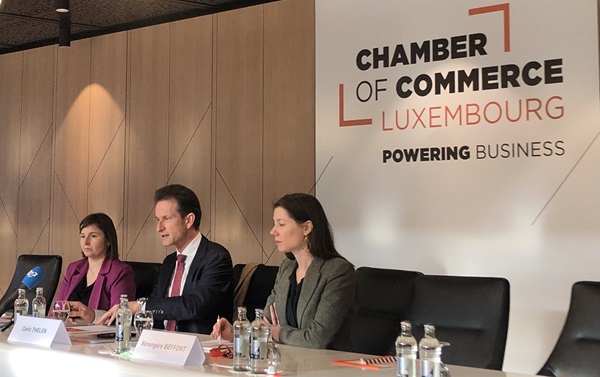 (L-R) Christel Chatelain, Director of Economic Affairs; Carlo Thelen, Director General;
Credit: Otilia Dragan/Chronicle.lu
(L-R) Christel Chatelain, Director of Economic Affairs; Carlo Thelen, Director General;
Credit: Otilia Dragan/Chronicle.lu
On the morning of Wednesday 13 December 2023, the Luxembourg Chamber of Commerce organised its end-of-the-year press conference featuring Carlo Thelen, Director General, and Christel Chatelain, Director of Economic Affairs.
Carlo Thelen noted that it has been a difficult year for businesses in Luxembourg. The challenging global, geopolitical context has influenced the economy which slowed down as inflation persisted and interest rates rose suddenly. Climate change proved to be more intense and faster than expected, having a dramatic impact on individuals, but also on the economy, he stressed.
Global debt reached record levels, with $310 billion by the end of 2023, creating major difficulties for developing countries and beyond. This is notably “dangerous for the global financial system” and worsened by a rise in populism, whereby promises are made that cannot be kept, Carlo Thelen added.
In Luxembourg, growth and activity have slowed down in 2023 as the country is in recession. Over the past few months, high inflation led to a severely reduced purchasing power. High interest rates then led to a demand crisis, which also affected the business financing condition and knocked the confidence of business owners. The current climate has not been positive for businesses – 54% noted that their activity has stagnated over the past six months, while 27% reported a decline in their activity (Baromètre de l’Economie). Certain segments were particularly pessimistic concerning the next six months: 42% of businesses in the construction sector, 39% of industries and 26% of transport businesses foresaw a deterioration of their activity.
Concerning the coalition agreement for 2023 to 2028, Christel Chatelain discussed major points that the Luxembourg Chamber of Commerce welcomed, the points that it was concerned about and those it considered were missing altogether. As soon as demand picks up, the recovery will be based in particular on an efficient, attractive and open labour market, the Luxembourg Chamber of Commerce noted. Facilitating the organisation of work and having a pool of talent must thereby respond to a need raised by employers and by extension revitalise the entire system. The Luxembourg Chamber of Commerce particularly welcomed the government's desire to maintain the 40-hour week and to develop a reform regarding the organisation of work within the framework of social dialogue. The possibility for employees to work until 20:00 on Sunday also meets the expectations of many companies, it noted. The Chamber of Commerce regretted, however, that the government does not show a clear desire to reform the in-depth apprenticeship system and create cross-border connections in the Greater Region. It could be interesting to consider new incentives to keep older workers employed, it noted.
The Luxembourg Chamber of Commerce emphasised that it welcomes the simplification of procedures and the further digitalisation that would enable both private and public services to be more efficient. However, they noted the need for better connectivity between the individual partners. Concerning the development of territories, the Luxembourg Chamber of Commerce welcomed the commitments which have been made to better respond to the demand for housing, in particular by stimulating construction. The Luxembourg Chamber of Commerce added that pension plans were another important point that should be discussed in 2024. Due to soaring public debt and the ageing population in Luxembourg, new solutions would need to be found for the Luxembourg demographic.
“The challenge is to preserve the economic substance in Luxembourg as it is crumbling for cyclical and structural reasons,” concluded Carlo Thelen. "Taking action from the early months of its mandate will send the signals businesses eagerly await, restoring lost confidence and paving the way for a substantial economic recovery in 2024."









